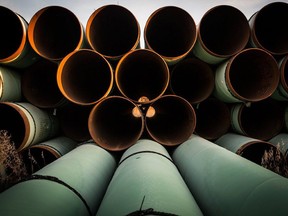Bottlenecks on the critical pipeline network have long been a source of frustration for western Canadian gas producers

Article content
TC Energy Corp. scored a win this week when the federal government approved an important expansion to its NOVA Gas Transmission Ltd. (NGTL) pipeline system, putting the Calgary-based company in a position to meet growing demand for natural gas in the United States.
Advertisement 2
Article content
But the glory of that victory was short lived. TC Energy’s stock was poised to end the week down some 10 per cent, after chief executive François Poirier revealed the price tag for the embattled Coastal GasLink pipeline project was expected to balloon once again.
Article content
The good news came Nov. 30, when the Canada Energy Regulator conditionally approved TC Energy’s West Path Delivery 2023 project, which will add an additional 40 kilometres of new natural gas pipeline to the existing 25,000-kilometre NGTL network, allowing the company to ship gas from the western Canadian Sedimentary Basin to markets in Canada and the U.S., specifically Washington, Oregon and California.
Bottlenecks on the critical pipeline network have long been a source of frustration for western Canadian gas producers, and has become an even greater source of contention as gas production has grown to record levels.
Advertisement 3
Article content
Earlier this year, as global gas prices were soaring thanks to red-hot demand overseas, spot prices at the AECO hub in western Canada collapsed and briefly turned negative as maintenance on the NGTL pipeline system resulted in reduced capacity, stranding gas supplies in Alberta and British Columbia.
Before the energy regulator revealed its decision, producers were celebrating TC Energy’s recently announced operating outlook for 2023, which said “meaningful” capacity had been added at key points on the NGTL, according to analysts.
“Outages in recent years have led to profound impacts on western Canadian natural gas pricing, with differentials blowing-out as volumes pressed against reduced capacity,” wrote Michael Shaw and Andrew Bradford of Raymond James in a recent research note. “The added capacity will provide (upstream producers) with room to grow production volumes, increased throughput at gas gathering processing facilities, liquids pipelines, and downstream liquid fractionation and marketing facilities.”
Advertisement 4
Article content
Ottawa’s approval of the pipeline expansion came with strings, however. TC Energy will have to meet 34 binding conditions related to environmental protections and the involvement of Indigenous people in the project monitoring and safety, according to Natural Resources Canada.
The company didn’t seem to mind. TC Energy said in a statement on Dec. 1 that construction on the West Path Delivery project could be complete by Nov. 1, 2023. The project is part of a $1.2-billion expansion program TC Energy first announced in 2019, underpinned by approximately 258 million cubic feet per day (mcf/d) of new long-term service contracts.
But if TC Energy executives were feeling celebratory about the approval, their enthusiasm was quickly dulled by the company’s acknowledgement of the ballooning cost of its Coastal GasLink pipeline project.
Advertisement 5
Article content
At TC Energy’s investor day event in Toronto on Dec. 1, the company said the 670-kilometre pipeline, which will ship natural gas to the LNG Canada export facility in Kitimat B.C., is 80 per cent complete. Getting to 100 per cent will require another material increase in cost, although TC Energy declined to say by how much.
In July, the company said Coastal GasLink’s price-tag had reached $11.2 billion, up from an earlier estimate of $6.6 billion. TC Energy blamed rising labour costs, a shortage of skilled labour and contractor underperformance and disputes for the latest cost overrun. It said a higher capital cost estimate would be provided early next year, and that the revised estimate would also factor in unforeseen events, including drought conditions, erosion and sediment control challenges.
Advertisement 6
Article content
-

CNRL sets new emissions target alongside pledge to boost shareholder returns
-

Suncor opts to keep its Petro-Canada gas stations in rebuff to activist investor
-

Ottawa is biggest obstacle to growth in oilpatch, charges Alberta premier in defiant speech
Bank of Nova Scotia analyst Robert Hope pegged the potential increase at between $1 billion and $3 billion.
“There were also limited details regarding the recoverability of the higher costs, whether through tolls, its partners, or its contractors,” Hope said in a research note. “The construction environment surrounding the CGL project remains challenging, given labour pressures as well as the productivity of its contractors.”
TC Energy was trading at around $58 per share as the trading week drew to a close, 11 per cent lower than their opening value on Nov. 28.
Advertisement 7
Article content
“While we are very disappointed making this announcement with respect to the increasing cost, our focus, and the way we’ll get to the finish line, is to continue to put our focus 100 per cent on safely pursuing the rest of the balance of the construction activities,” Bevin Wirzba, TC Energy’s president of Coastal GasLink, said at the event in Toronto.
“We continue to see long-term value in the project. We see it’s going to be not only helpful for our customers, but it’s obviously strategic for the broader basin.”
• Email: mpotkins@postmedia.com | Twitter: mpotkins
Clarification: An earlier version of this story incorrectly identified Bevin Wirzba as TC Energy’s vice-president of Canadian natural gas pipelines. His complete title is executive vice-president, strategy and corporate development, group executive, Canadian natural gas and liquids pipelines and president of Coastal GasLink.
